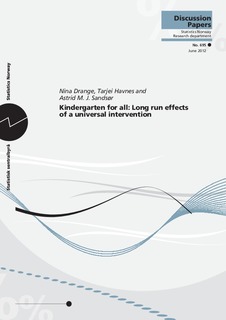| dc.contributor.author | Drange, Nina | |
| dc.contributor.author | Havnes, Tarjei | |
| dc.contributor.author | Sandsør, Astrid M. J. | |
| dc.coverage.spatial | Norway | nb_NO |
| dc.date.accessioned | 2019-11-13T10:27:22Z | |
| dc.date.available | 2019-11-13T10:27:22Z | |
| dc.date.issued | 2012-06 | |
| dc.identifier.issn | 0809-733X | |
| dc.identifier.uri | http://hdl.handle.net/11250/2628141 | |
| dc.description.abstract | Theory and evidence points towards particularly positive effects of high-quality child care for disadvantaged children. At the same time, disadvantaged families often sort out of existing programs. To counter differences in learning outcomes between children from different socioeconomic backgrounds, European governments are pushing for universal child care. However, empirical evidence on the effects of universal programs is scarce. We provide evidence on the longrun effect on schooling of mandating kindergarten at age 5--6. Our identifying variation comes from a reform that lowered school starting-age from 7 to 6 in Norway in 1997. Our precise DD estimates reveal hardly any effect, both overall, across subsamples, and over the grading distribution. A battery of specification checks supports our empirical strategy. | nb_NO |
| dc.description.sponsorship | The Research Council of Norway | nb_NO |
| dc.language.iso | eng | nb_NO |
| dc.publisher | Statistisk sentralbyrå | nb_NO |
| dc.relation.ispartofseries | Discussion papers;695 | |
| dc.subject | JEL classification: J13 | nb_NO |
| dc.subject | JEL classification: H40 | nb_NO |
| dc.title | Kindergarten for all. Long run effects of a universal intervention | nb_NO |
| dc.type | Working paper | nb_NO |
| dc.description.version | publishedVersion | nb_NO |
| dc.subject.nsi | VDP::Matematikk og Naturvitenskap: 400::Matematikk: 410::Statistikk: 412 | nb_NO |
| dc.source.pagenumber | 35 | nb_NO |
